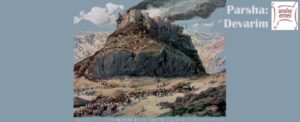Image: J. James Tissot: The Conquest of the Amorites
Parsha Devarim
I. Summary
Moshe Reviews The Events And Experiences During The Years In The Wilderness. As the Jews neared Israel, Moshe began to review the events and experiences which had occurred during their years in the wilderness. In this Parsha, Moshe recalled:
A. The Journey From Sinai; The Appointment of Judges and Administrators; The Meraglim (Spies). At Mt. Sinai, Hashem had commanded the Jews to break camp and journey to Israel. Moshe claimed that he was unable to bear the burden of leadership alone and judges and administrators were appointed to help him. On the verge of entering Israel, the Jews were dismayed by the Meraglim’s pessimistic report and complained to Hashem; their lack of faith led to their extended wandering in the desert during which time almost all of the older generation died.
B. The Jews Defeated Sichon and Og. After the Jews had encamped at Mt. Seir for a long period, they were told to continue their journey by passing through the land of Edom, although they were told not to engage in any hostilities since this territory had been promised to Esav’s descendants. They were similarly told not to attack the residents of Moav, for their land was reserved for Lot’s children. They did, however, defeat Kings Sichon and Og, and fear of the Jews began to spread amongst the neighboring nations.
C. The Land Of Gilad. As discussed in Mattos, the land of Gilad had been given to the tribes of Reuven, Gad and part of the tribe of Menasseh (with the proviso that they join their fellow Jews in the battle to conquer Israel). Moshe encouraged Yehoshua not to fear the nations living in Israel.
II. Divrei Torah
A. Lil’Mode Ul’lamed (Rabbi Mordechai Katz)
1. Greatness Has Many Levels. After Moshe protested that he was unable to bear the burden of leadership alone, Hashem advised him to select judges and administrators to assist him. But why was Moshe — who led the Jews out of Egypt, performed miracles, etc. — unable to lead the people on his own? Had his power diminished? Moshe remained a powerful leader; however, Hashem did not think it would be beneficial for Moshe to monopolize the mantle of leadership. For had he done so, the other Jews would have had no incentive to reach great heights (since they could never reach or even approach Moshe’s level). While the seventy Elders appointed by Moshe couldn’t hope to reach his level of eminence, they did attain their own pinnacle of distinction, evidencing that there are many levels of greatness and that each of us has the opportunity to reach our unique degree of prominence. As Rabbi Moshe Feinstein, zt’l said, “Hashem commanded the appointment of judges at all levels in order to present a goal for everyone; even someone who isn’t blessed with the abilities of a Moshe can still aspire to be a judge over a thousand or hundred, or a least fifty or ten. Whatever level he attains, however great or humble, can then be used as a stepping stone from which to strive for even higher and higher plateaus (Darash Moshe)”. We each must strive to discover how we can best utilize our talents to serve Hashem and our fellow man. A famous story is told in the name of many great Chassidic Rebbes, including Reb Zusia. He often said that after a person dies and ascends to the heavens for judgment, he is required to defend his past actions and behavior. But, he isn’t asked why he wasn’t as great as Moshe, as learned as Rabbi Akiba, etc. Each person has difficult capabilities and is only asked why he didn’t use his G-d-given talents to the fullest — was he as great as he could have been?!
2. The Right Association. Moshe refers to the Euphrates as the “Great River”. Rashi commented that it is referred to as “great” because it is mentioned together with the land of Israel. The same is true of people — if they associate with great people, leaders and scholars, they too can be called great. This is why the company we choose is so important — if we select companions with undesirable character, their corrupt ways will rub off; if, however, we surround ourselves with good and ethical people, we gain for ourselves not only a good name, but their positive traits will serve as a model upon which to base our own behavior.
B. Peninim on the Torah (Rabbi A.L. Scheinbaum)
1. Holding on to our Heritage. “May He make you so many more like you a thousand times, and may He bless you as He has promised you”. This prayer by Moshe asks Hashem to make future generations “like you” (i.e., following in the path of Torah paved by our ancestors). In order for this prayer to be realized, we must imbue our children with a link in the chain of tradition — Torah learning and every historical event, sad as well as joyous events, must be a part of our children’s personal “experience”. Today’s blessing must coincide with the pattern of yesterday’s values.
2. Recognizing Others’ Suffering. “How can I myself bear your bothersomeness and your burden and strife?” The Midrash in Eichah distinguishes among three prophets who prefaced their prophecy with the word “Eichah”: (1) Moshe, who bemoaned his obligations to deal personally with all of the Jews’ strife and complaints; (2) Yeshayahu, who lamented the Jews’ infidelity; and (3) Yirmiyahu, who beheld the Jews in their disgrace. The digression of the Jews became progressively worse during each of their three tenures. We often complain about our lot in life, not realizing that it is all relative and that others may be experiencing even greater hardships. We must learn to view our fate in the proper perspective that it reflects the decisions of Hashem, who in His infinite wisdom knows what is best for us.
C. Growth Through Torah (Rabbi Zelig Pliskin)
1. Master the art of seeing the good in others. Rashi cites the Sages: “If Moshe came out of his house early the people would say Why is Moshe early? Perhaps he is having family problems at home’. If he came out late from his house, they would say Moshe stays home longer in order to devise negative plans against you'”. Someone with a tendency to judge others negatively will always find faults in others. But, there are always positive ways to interpret others’ behavior — if Moshe came out early, they could have said “Look at his willingness to sacrifice his time at home to help others”; if he came late, they could have said “He wants to prepare himself properly so as to be most effective at giving good advice.” The way we interpret events has more to do with our character traits than it does with the reality of what someone else is like. The Torah commands us to judge others favorably. The more we do so, the better we ourselves will feel.
2. Treat others as close relatives. “And I commanded your judges at that time saying, listen among your brothers. Per Rabbi Zalman Sorotzkin, this teaches us to treat anyone who comes to us as a brother or sister. (Rashi cites the Sifri that Moshe was also telling the judges that, in settling quarrels, one must remember that every life situation is different; accordingly, each case should be viewed as entirely new and every detail considered.)
3. If you feel love towards others, you will assume that they have love for you. “And you complained in your tents, and you said, because the Almighty hated us he took us out of Egypt to hand us over to the Emorites to destroy us”. Rashi comments that Hashem really loved the Jews but because they felt hatred towards Him, they mistakenly felt that He hated them. (As Rabbi Goldberg notes, this may the first case of “projection”.) We all tend to project our feelings towards others onto them. If you think that everyone disapproves of you, you likely don’t approve of others and/or yourself. Conversely, if you feel love and compassion for others, you will assume that others feel positive about you.
D. Kol Dodi On The Torah (Rabbi David Feinstein)
The True Source of Wealth. “And Di Zahav”. Rashi interprets the place of Di Zahav (mentioned at the outset of the Parsha) to etymologically refer to the “excess gold” that the Jews acquired upon leaving Egypt (and from which they created the Golden Calf). There are two distinct possible orientations towards newly acquired wealth: (1) one who views himself as a “self-made” man is likely to have an arrogant manner towards his new found wealth and ignore the responsibilities associated with this blessing; or (2) one who understands that everything ultimately belongs to Hashem is likely to recognize that he has been endowed with the opportunity to be a conduit of material blessings to those in need. That was the nature of Moshe’s rebuke to the Jews — had they appreciated their Divine gift and recognized the responsibility to use it wisely, they wouldn’t have yielded to their base instincts to create the Golden Calf.
E. In The Garden Of The Torah (the Lubavitcher Rebbe, Rabbi Menachem M. Schneerson, z’tl)
A Mortal Mouth Speaking G-d’s Word. This Parsha begins: “These are the words that Moshe spoke to the entire Jewish people”. Unlike the first four Books of the Chumash (which are “Hashem’s word”), Chazal explain that Moshe recited Devarim “on his own initiative”. What does this mean? Moshe’s words were clearly “inspired by the Holy Spirit” (as the Zohar notes, “the Divine Presence spoke from Moshe’s mouth”). However, it is also clear that this Book includes Moshe’s own thinking process. Chassidic thought describes two ways in which a “go-between” functions: (1) derech ma’avir — he acts merely as a funnel (i.e., he doesn’t change or modify the influence he receives); thus, the message remains transcendent; or (2) derech hislabshus — he puts the concept in his own words, allowing it to be grasped by the recipients. Moshe acted as a derech ma’avir during the first four Books, and a derech hislabshus during the Book of Devarim. What purpose is served by the latter? Doesn’t enclothing the Torah in human intellect only lower its spiritual content? G-d’s intent in giving the Torah was that it permeate mortal thought and elevate man’s understanding. Were there only the first four Books, it would have been impossible for our powers of understanding to unite completely with the Torah. Moshe recited Devarim as the Jews were preparing to enter Israel, where they would have to live within natural order, working the land and eating the fruits of their labor (as opposed to relying on Hashem’s miracles) To make this transition possible, they required an approach to Torah that would relate to man as he functions in his worldly environment. It is through this goal — the fusion of the word of G-d with mortal wisdom — that we will merit the coming of the Messianic Age.
F. Chassidic Dimension (the Lubavitcher Rebbe, Rabbi Menachem M. Schneerson, z’tl)
Shabbos Chazon. The opening passage of Devarim is invariably read on the Shabbos preceding the Ninth of Av (the fast which commemorates the destruction of the First and Second Temples and other tragedies). This Shabbos is known as “Shabbos Chazon”, because the first word of the Haftorah is “Chazon” (vision). How does the word “Chazon” relate to this period preceding the Ninth of Av? Rabbi Levi Yitzchak of Berditchev explains that on this Shabbos, “every Jew is shown from afar a vision of the future Holy Temple”. He explains this with the following parable: A father had a precious garment sewn for his son, who promptly tore it to shreds. The father then had a second garment sewn, which the child once again tore up. The father had yet a third garment sewn; this time, however, he didn’t permit his son to wear it. Rather, he only allowed his son to gaze at it at appointed times, telling him that when he began to conduct himself properly, he would allow him to wear it. In this way, the father trained his son to act in a manner that ultimately became his second nature. At this point, the father gave him the garment and allowed him to wear it. On Shabbos Chazon, the future Holy Temple is shown to all Jews — the purpose of this revelation is to train us to act properly and to arouse a longing in our heart (which is so strong that it causes us to mend our ways, until acting in an upstanding manner becomes second nature). Although the Holy Temple is shown “from afar”, it is nonetheless revealed in a manner whereby it becomes internalized within every single Jew.
G. Living Each Week (Rabbi Abraham Twerski)
1. To be fair in judgment. “Listen amongst your brethren and you shall judge fairly.” The Talmud teaches that this verse instructs a judge from listening to one litigant in the absence of his opponent. We have both the yetzer hatov (good inclination) and yetzer hara (bad inclination). It would be grossly unjust to render a decision after only listening to the arguments on one side (i.e., on the yetzer hara’s side). Thus, whenever we have an urge to do something, we should delay acting on it until we have had the opportunity to deliberate on the merits of the act. We all be careful in “judging” the propriety of our conduct.
2. Therapeutic listening. “And whatever shall be too difficult for you, you shall bring to me and I shall listen to it.” It is common knowledge in psychology that in the process of describing a particular problem, the client discovers its solution. The Talmud interprets the verse in Proverbs that “if one has a worry, let him relieve himself of it,” to mean that one should relate it to another person since this is likely to bring relief. The Rabbi of Gur notes that this has its origin in Moshe’s above quotation. Note that Moshe does not say, “I will solve it,” but rather “I will listen.” Simply by listening, and by allowing another person to describe the problem, you can assist him in finding a solution.
3. Faith and tranquility. “It has now been forty years that Hashem has been with you; you have lacked nothing.” Not only can this verse be read as it actually appear, but even if the sequence of its two parts is reversed, we can learn an important truth. If a person believes that G-d is with him, and he is secure with G-d, he lacks nothing for he knows that G-d will provide for his needs. One who trusts only in oneself is always in a state of need. It was said that the multi-billionaire, J. Paul Getty, was once asked, “how much is enough?” He responded, “just a bit more.” The reverse is equally true. The individual who is satisfied with whatever he has and feels that he is not lacking anything can achieve a closeness with Hashem since he has the peace of mind necessary to truly connect with Hashem. The person who feels he is constantly lacking, however, is unlikely to have the time and peace of mind with which to contemplate a closer relationship with Hashem. Belief in Hashem and happiness with one’s lot are thus mutually reinforcing and result in a cycle which elevates a person to serenity and profound faith.




 Visit the group and request to join.
Visit the group and request to join.
